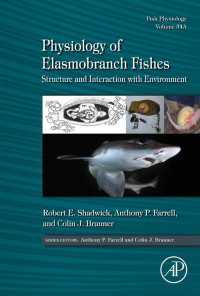Description
Advanced materials are essential for economic security and human well-being, with applications in industries aimed at addressing challenges in clean energy, national security, and human welfare. Yet, it can take years to move a material to the market after its initial discovery. Computational techniques have accelerated the exploration and development of materials, offering the chance to move new materials to the market quickly. Computational Technologies in Materials Science addresses topics related to AI, machine learning, deep learning, and cloud computing in materials science. It explores characterization and fabrication of materials, machine-learning-based models, and computational intelligence for the synthesis and identification of materials. This book
• Covers material testing and development using computational intelligence
• Highlights the technologies to integrate computational intelligence and materials science
• Details case studies and detailed applications
• Investigates challenges in developing and using computational intelligence in materials science
• Analyzes historic changes that are taking place in designing materials.
This book encourages material researchers and academics to develop novel theories and sustainable computational techniques and explores the potential for computational intelligence to replace traditional materials research.
Table of Contents
Chapter 1 Fabrication and Characterization of Materials
[Laxman Raju Thoutam]
Chapter 2 Application to Advanced Materials Simulation
[Soumyajit Maitra, Souhardya Bera, and Subhasis Roy]
Chapter 3 Molecular Dynamics Simulations for Structural
Characterization and Property Prediction of Materials
[S. K. Joshi]
Chapter 4 Desirability Approach-Based Optimization of Process
Parameters in Turning of Aluminum Matrix Composites
[P.V. Rajesh and A. Saravanan]
Chapter 5 Spark Plasma-Induced Combustion Synthesis,
Densification, and Characterization of Nanostructured
Magnesium Silicide for Mid Temperature Energy Conversion
Energy Harvesting Application
[P. Vivekanandhan, R. Murugasami, and S. Kumaran]
Chapter 6 The Role of Computational Intelligence in Materials Science:
An Overview
[J. Ajayan, Shubham Tayal, Sandip Bhattacharya,
and L. M. I Leo Joseph]
Chapter 7 Characterization Techniques for Composites using
AI and Machine Learning Techniques
[Dr. Zeeshan Ahmad, Dr. Hasan Zakir Jafri,
and Dr. R. Hafeez Basha]
Chapter 8 Experimental Evaluation on Tribological Behavior of TiO2
Reinforced Polyamide Composites Validated by Taguchi
and Machine Learning Methods
[S. Sathees Kumar, Ch. Nithin Chakravarthy, and R. Muthalagu]
Chapter 9 Prediction of Compressive Strength of SCC-Containing
Metakaolin and Rice Husk Ash Using Machine Learning
Algorithms
[Sejal Aggarwal, Garvit Bhargava, and Parveen Sihag]
Chapter 10 Predicting Compressive Strength of Concrete Matrix Using
Engineered Cementitious Composites: A Comparative Study
between ANN and RF Models
[Nitisha Sharma, Mohindra Singh Thakur, Viola Vambol,
and Sergij Vambol]
Chapter 11 Estimation of Marshall Stability of Asphalt Concrete
Mix Using Neural Network and M5P Tree
[Ankita Upadhya, Mohindra Singh Thakur,
Siraj Muhammed Pandhian, and Shubham Tayal]
-

- 電子書籍
- 神を【神様ガチャ】で生み出し放題【分冊…
-

- 電子書籍
- 蟲愛づる姫君の結婚~後宮はぐれ姫の蠱毒…
-

- 電子書籍
- シンデレラが結婚したので意地悪な義姉は…
-

- 電子書籍
- 役立たずと言われたので、わたしの家は独…
-

- 洋書電子書籍
- Physiology of Elasm…



